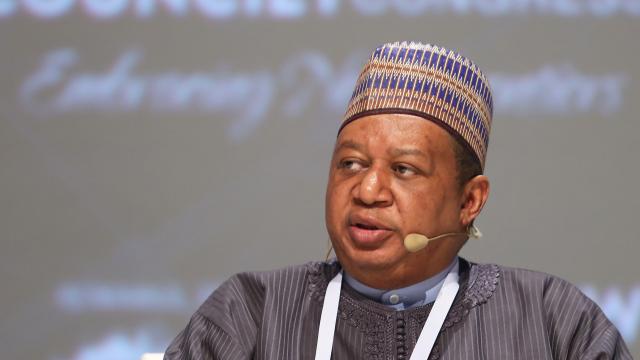
OPEC Secretary-General Mohammad Barkindo said all options are open as the cartel deals with oil demand challenges. (Source: Prometheus72 / Shutterstock.com)
LONDON—A deeper cut in oil supplies is among options for OPEC and its allies to consider in December, its secretary general said on Oct. 10 as the producer group’s forecasts pointed to slower global growth and lower demand next year.
OPEC, Russia and other producers, an alliance known as OPEC+, have since January implemented a deal to cut oil output by 1.2 million barrels per day (bbl/d) to support the market. The pact runs to March 2020 and the producers meet to set policy on Dec. 5-6.
“The conference will take appropriate, strong, positive decisions that will set us on the path of heightened and sustained stability for 2020,” Mohammad Barkindo told reporters at a briefing in London.
“All options are open,” he said, when asked about the prospect of a deeper oil supply cut.
Oil prices have failed to gain a lasting boost from supply disruptions this year, including the attack last month on Saudi Arabian oil installations that briefly shut down more than half of production in the world’s top exporter.
Brent crude was trading near $58 a barrel, down from a 2019 high near $75 in April. Concern about weaker economies and demand due to uncertainties such as Brexit and the U.S.-China trade dispute have overshadowed lower supply.
While the last meetings of OPEC and its allies in July decided on supply for the next nine months, the next meeting in Vienna will likely take a longer view.
“As we approach December, we will be faced with real data for 2020 which will enable us to probably review the current arrangement and come up with a decision that probably will cover the whole of the year,” Barkindo said.
OPEC separately released its October monthly oil market report on Oct. 10 in which it trimmed its forecast for world economic growth in 2020 to 3% from 3.1%, saying “it seems increasingly likely that the slowing growth momentum in the U.S. will carry over to 2020.”
Barkindo, speaking to reporters on the sidelines of the annual Oil & Money conference, sounded a more upbeat tone, saying data on 2020 was preliminary and could surprise to the upside.
Lower 2020 Demand
In a forecast that could press the case for further supply restraint in 2020, OPEC continues to see a drop in demand for OPEC crude next year due to higher supply from rivals such as the United States.
Global demand for OPEC crude will average 29.6 million bbl/d, OPEC said in the report, a drop of 1.2 million bbl/d from 2019. Should OPEC keep pumping at August’s rate—the level before the Saudi attacks—that implies a surplus of about 200,000 bbl/d.
OPEC said that in September the group’s production was 1.32 million bbl/d lower month-on-month at 28.49 million bbl/d, largely due to the Saudi attacks.
Saudi Arabia has stressed that it restored output quickly, but told OPEC that its production in September fell by 660,000 bbl/d from August to 9.13 million bbl/d.
Secondary sources that OPEC uses to monitor its output said Saudi production was even lower, falling by 1.28 million bbl/d to 8.56 million bbl/d.
OPEC left unchanged its 2020 forecast that global oil demand would grow in 2020 by 1.08 million bbl/d.
Supply from non-OPEC producers will expand by a much faster 2.2 million bbl/d even after a downward revision the Oct. 10 report, keeping up the pressure on OPEC and its allies to avoid a larger surplus next year.
Recommended Reading
After Challenging Year, Which Way Will Offshore Wind Blow?
2024-04-03 - Following a year of negative headlines with some of the industry’s biggest players booking billion-dollar impairments and backing out of wind projects, this year appears to be going smoother.
Energy Transition in Motion (Week of Feb. 9, 2024)
2024-02-09 - Here is a look at some of this week’s renewable energy news, including the latest on a direct lithium extraction technology test involving one of the world’s biggest lithium producers and the company behind the technology.
First US Utility-scale Offshore Wind Farm Starts Operations
2024-03-14 - The 12-turbine, 130-megawatt South Fork Wind project is a joint venture between Denmark's Orsted and New England-based electric utility Eversource.
Energy Transition in Motion (Week of Feb. 23, 2024)
2024-02-23 - Here is a look at some of this week’s renewable energy news, including approval of the construction and operations plan for Empire Wind offshore New York.
NZT Power, NEP Pick Contractors for Teesside-based Decarbonization Projects
2024-03-15 - About $5.1 billion in work will go to the contractors once projects reach FID, which is expected in September.




